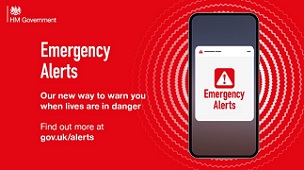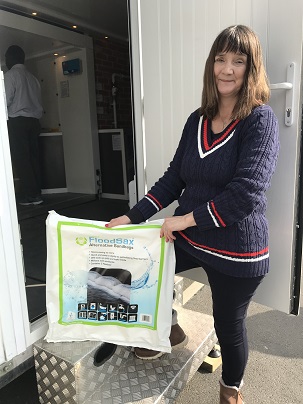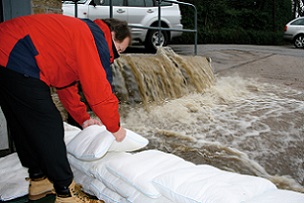 The Government's new Emergency Alerts system
The Government's new Emergency Alerts system
 Leading UK flood campaigner Mary Dhonau with a pack of 5 FloodSax alternative sandbags
Leading UK flood campaigner Mary Dhonau with a pack of 5 FloodSax alternative sandbags
 FloodSax in action diverting a torrent of floodwater
FloodSax in action diverting a torrent of floodwater
UK government's new flood early warning system is great … but doesn’t go far enough
A government scheme to alert you to a serious emergency in your area doesn’t go far enough when it comes to flood warnings, it is claimed.
Emergency Alerts is a UK government service that will warn you if there’s a danger to life nearby via a siren on your mobile phone.
In an emergency such as severe flooding, extreme weather or fires your mobile phone or tablet will receive an alert with advice about how to stay safe.
The flooding one is triggered by the risk of river or coastal flooding but the UK’s leading flood campaigner says it doesn’t go far enough and should include flash floods too.
For instance, London has been hit by three major flash floods during the last two summers with water pouring into basement apartments and underground stations.
Mary Dhonau is a national flood campaigner who is regularly seen on TV talking about the danger of floods.
She said: “Emergency Alerts is obviously a great thing but I hope these warnings will extend to surface water and flash floods as to date people at risk of flooding only receive river or coastal flood warnings.
“Flash floods are so difficult to prepare for. That’s why I always tell everyone they should plan for the worst as you never know when it may happen and that even includes people who live on hills.”
Mary travels the country in a Floodmobile and encourages those who live at flood risk to use FloodSax alternative sandbags to supplement Property Flood Resilience measures as they help to reduce any leakage.
Mary - who has her own highly informative website called floodymary.com - dislikes the humble sandbag with a vengeance as they simply don’t work and are environmentally unsustainable.
The Emergency Alerts will be tested on the early evening of Sunday, April 23, so everyone should receive them on their mobile phone so they know what they look and sound like.
Phone owners need to acknowledge the alert before they can use their phone again.
A message will appear on the phone’s home screen during the test with vibration and a loud warning sound that will ring for about 10 seconds, even if the phone is set to silent.
The system has been modelled on similar schemes in the US, Canada, Japan and the Netherlands where it has been proven to have saved lives.
Messages would only ever come from the government or emergency services and will initially focus on the most serious weather-related events. Using mobile phones means they can get a message to 90% of mobile users within the area at risk.
Terror alerts could be added to the list of potential events that would trigger a notification in the future.
The messages will include details of the area in danger and instructions on how to respond. They will only be sent where there is an immediate risk to life and many people may not receive an alert for months or years.
By broadcasting from cell towers in the vicinity of an emergency, the alerts are secure, free to receive and one-way. They do not reveal anyone’s location or collect personal data.
The new system uses cell broadcasting technology from cell towers in the vicinity of an emergency.
Cabinet minister Oliver Dowden, whose role as Chancellor of the Duchy of Lancaster gives him oversight of the preparation and planning for emergencies, said people are likely to hear the alert in instances where there has been a major flood and “your house was at risk of being inundated and your life is at risk.”
Caroline Douglass, Executive Director for Flood and Coastal Erosion Risk Management at the Environment Agency, added: “Being able to communicate warnings in a timely and accurate manner during incidents is really important to help people take action to protect themselves, their families and their neighbours.”